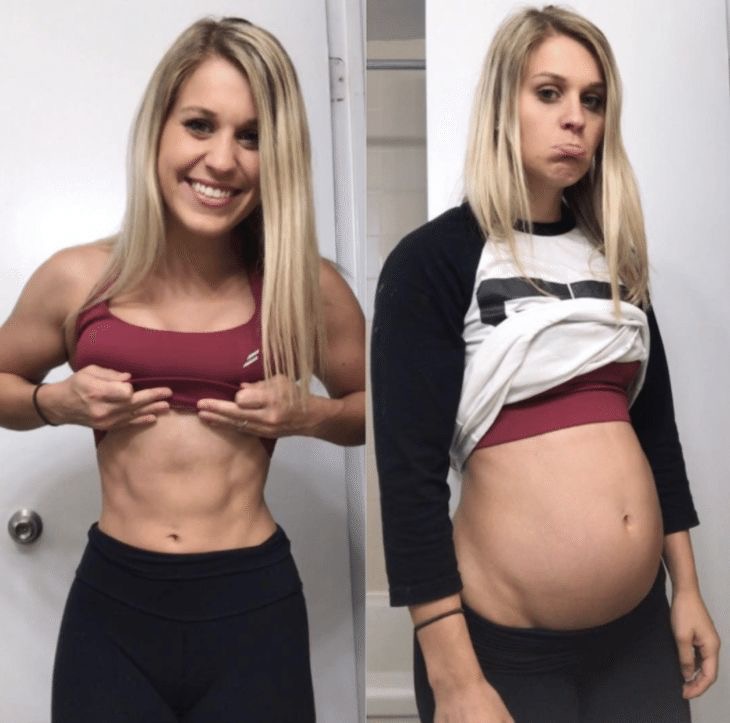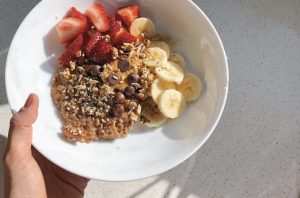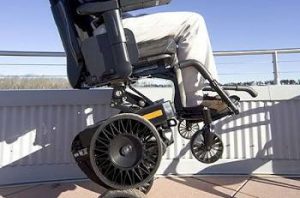
In all seriousness and aside from jokes about chocolate, it should be known that each woman experiences menstruation and her period differently. For some, premenstrual syndrome is no big deal, but for others, it can be extremely painful and quite possibly crippling. Victoria Dariano shared a side-by-side photo on Instagram showing just how serious PMS can be for some people.
Her PMS gave her extreme bloating and cramps, causing her stomach to feel “as hard as a rock.”
She becomes drained of all energy and begins to feel “down and numb, and not like myself.” She also gets cramps and uncomfortable bloating and water retention, as well as a gassy and upset stomach. PMS also causes her to be moody and emotional.
Instead of working out like she planned to after she took the now-viral pic, she decided to do what was best for her body at the time and rest.
Sometimes when you have symptoms like this you have to listen to your body,” she wrote in her post. “I wanted to train, but I was uncomfortable and exhausted.
Most importantly, she didn’t beat herself up over her decision to put her well-being first.
Go a little easier on yourself when it’s the time of the month and you are stressed out,” she wrote. “Get extra rest, don’t stress about workouts and eat some treats if you feel like it.
Others praised Dariano for her post, relating to her experiences with such debilitating PMS symptoms.
“This helps a lot knowing that other people struggle with having low to no energy whilst on your period, and it makes it really difficult to train, and can make me feel down in my self esteem like I’m not trying hard enough,” someone commented. “But posts like these motivate me to keep going and you inspire me to carry on, and your figure is stunning!!”
“Thank you for making me know I’m not alone,” someone else added. “It really sucks and makes me feel sooo down, but when you see it’s normal then it really makes you feel so much better, thank you.”
Dariano’s post serves as a simple, but evidently important, reminder.
Many women experience bloating before and at the start of their period. Can certain lifestyle changes offer some relief?
Period bloating can be uncomfortable and may negatively affect self-confidence. Women may feel like they have gained weight or that their stomach is swollen and sticking out.
Fortunately, there are changes women can make that may reduce these symptoms.
What is period bloating?
Period bloating is when a woman feels her abdomen is heavy and swollen just before and at the start of her period.
Bloating is also one of several premenstrual syndrome (PMS) symptoms that can occur 1-2 weeks before a woman’s period. Other than bloating, PMS symptoms include:
* mood swings
* tiredness
* cramps
* acne
* food cravings
* swollen breasts
* headaches
* backaches
*
Up to 85 percent of women experience PMS symptoms, according to the American College of Obstetricians and Gynecologists.
Causes
Bloating before and during a period may result from changes in levels of the sex hormones progesterone and estrogen.
About a week before a woman’s period starts, levels of the hormone progesterone fall. Reduced levels of progesterone cause the uterus to shed its lining, which is what causes menstrual bleeding.
As well as causing menstrual bleeding, research suggests that changes in progesterone and estrogen levels cause the body to retain more water and salt. The body’s cells become swollen with water, causing the feeling of bloating.
A 2011 study found that women retained most water and experienced the worst bloating on the first day of their period.
Remedies
There are many lifestyle changes that a woman can make that may help to reduce water retention. In turn, these changes may help relieve the symptoms of period bloating.
1. Avoid salty foods
The sodium in salt can increase the amount of water a person’s body retains. Avoiding salty foods may help decrease water retention and improve period bloating.
The American Heart Association recommend people aim to limit their salt intake to 1,500 milligrams (mg) per day. Many processed foods contain salt, so cooking meals at home using only fresh ingredients is one way to avoid excess salt.
2. Eat potassium-rich foods
Eating foods rich in potassium may help reduce period bloating.
Research shows potassium decreases sodium levels and increases urine production. In this way, potassium may help reduce water retention and improve period bloating.
Potassium-rich foods that may reduce period bloating include:
* dark leafy greens, such as spinach
* sweet potato
* bananas
* avocados
* tomatoes
*
3. Try diuretics
If something is a diuretic, it means that it increases urine production. Producing more urine helps the body to get rid of water. In this way, diuretics help to reduce water retention.
Since water retention causes period bloating, diuretics may provide relief. Many foods have natural diuretic properties. Women who are looking to relieve period bloating may want to try eating more of these types of food.
Foods that act as natural diuretics include:
* asparagus
* pineapples
* peaches
* cucumber
* leeks
* ginger
* garlic
Diuretics are also available in pill form. A doctor may prescribe these if period bloating is more severe and other home treatments have not helped.
4. Drink oodles of water
Many people believe drinking more water can help to improve water retention, by improving kidney function.
If this is the case, drinking more water may help to improve period bloating. It should be noted, however, that there is no scientific evidence to support this presently.
Nevertheless, drinking more water improves hydration, which generally improves the way a person feels. For this reason, drinking more water is always worth a try.
5. Avoid refined carbohydrates
Refined carbohydrates, such as white flour and processed sugars, cause spikes in blood sugar levels. This increases the level of insulinin the blood, which causes the kidneys to retain more sodium.
Increased sodium levels lead to more water retention. For those looking to reduce water retention and improve period bloating, it is best to avoid refined carbohydrates.
6. Exercise regularly
A 2013 study found that regular exercise might help improve PMS symptoms. As period bloating is a PMS symptom, regular exercise may help to reduce it.
To stay healthy, people should aim to get 2.5 hours of moderate exercise a week.
7. Consider the birth control pill
A 2008 study suggests the birth control pill may help improve period bloating. However, some women report that the birth control pill makes them feel more bloated.
The effect of the pill can vary from woman to woman, so it is best to discuss the birth control pill with a doctor and to try a few different types to see which one works best for managing PMS.
When to see a doctor
For most women, period bloating is unpleasant but does not stop them from being able to get on with their day.
However, if period bloating affects a woman’s daily life, it is a good idea for her to speak to her doctor.
If bloating does not go away after a period, it is also a good idea to talk to a doctor. Bloating can sometimes be a sign of a more serious health condition.
Outlook
Trying one of several of the lifestyle changes mentioned in this article may help to improve period bloating.
If none of these changes help, and period bloating is disrupting daily life, then a doctor can provide further advice.
Source Cafe Mom, medical news today




